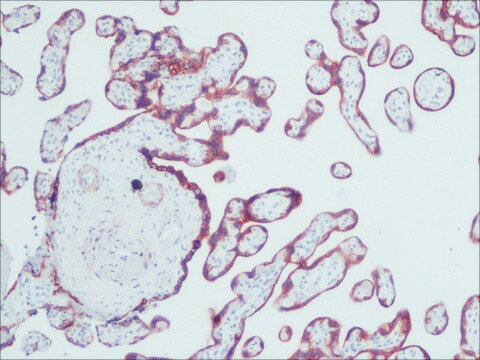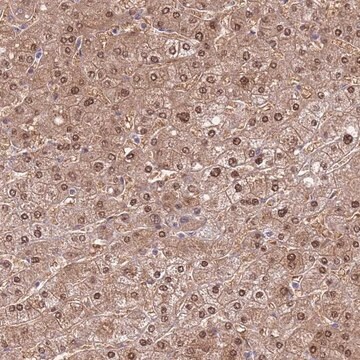IHCR2025-6
IHC Select Anti-Cytokeratin AE1/AE3 (Pan cytokeratins) Antibody, prediluted, clone AE1/AE3
clone AE1/AE3, from mouse
About This Item
Produits recommandés
Source biologique
mouse
Niveau de qualité
Forme d'anticorps
purified antibody
Type de produit anticorps
primary antibodies
Clone
AE1/AE3, monoclonal
Espèces réactives
human
Fabricant/nom de marque
Chemicon®
IHC Select
Technique(s)
immunohistochemistry: suitable (paraffin)
Isotype
IgG1
Conditions d'expédition
wet ice
Modification post-traductionnelle de la cible
unmodified
Informations sur le gène
human ... KRT1(3848)
Description générale
Spécificité
Immunogène
Application
Pretreatment: Heat Induced Epitope Retrieval (HIER). Recommend Citrate Buffer, pH 6.0 (Cat. No. 21545). No signal was detected without Epitope retrieval.
Incubation: 10 minutes with IHC Select Detection Kits.
Cytokeratin AE1/AE3 has been prediluted for use as the primary antibody with Chemicon′s IHC Select Detection Kits and Protocols (Catalog Nos. DAB050, DET-HP1000, APR050, and DET-APR1000), but other supplier′s IHC detection systems may be used. For optimized protocol details, visit www.chemicon.com and select the protocols link under Cat. No.IHCR2025-6.
Cell Structure
Cytokeratins
Forme physique
Stockage et stabilité
Informations légales
Clause de non-responsabilité
Vous ne trouvez pas le bon produit ?
Essayez notre Outil de sélection de produits.
Mention d'avertissement
Warning
Mentions de danger
Conseils de prudence
Classification des risques
Aquatic Chronic 3 - Skin Sens. 1
Code de la classe de stockage
12 - Non Combustible Liquids
Classe de danger pour l'eau (WGK)
WGK 2
Point d'éclair (°F)
Not applicable
Point d'éclair (°C)
Not applicable
Certificats d'analyse (COA)
Recherchez un Certificats d'analyse (COA) en saisissant le numéro de lot du produit. Les numéros de lot figurent sur l'étiquette du produit après les mots "Lot" ou "Batch".
Déjà en possession de ce produit ?
Retrouvez la documentation relative aux produits que vous avez récemment achetés dans la Bibliothèque de documents.
Notre équipe de scientifiques dispose d'une expérience dans tous les secteurs de la recherche, notamment en sciences de la vie, science des matériaux, synthèse chimique, chromatographie, analyse et dans de nombreux autres domaines..
Contacter notre Service technique









